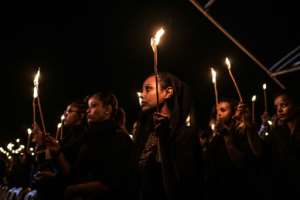Russia accused the West on Monday of “whipping up tensions” over Ukraine and said the U.S. had brought “pure Nazis” to power in Kyiv as the U.N. Security Council held a stormy and bellicose debate on Moscow’s troop buildup near its southern neighbor.
U.S. Ambassador Linda Thomas-Greenfield shot back that Russia’s growing military force of more than 100,000 troops along Ukraine’s borders was “the largest mobilization” in Europe in decades, adding that there has been a spike in cyber attacks and Russian disinformation.
“And they are attempting, without any factual basis, to paint Ukraine and Western countries as the aggressors to fabricate a pretext for attack,” she said.
The harsh exchanges in the Security Council came as Moscow lost an attempt to block the meeting and reflected the gulf between the two nuclear powers. It was the first open session where all protagonists in the Ukraine crisis spoke publicly, even though the U.N.’s most powerful body took no action.
Hours later, the Russian government sent a written response to a U.S. proposal aimed at deescalating the crisis, according to three Biden administration officials. The officials all spoke on the condition of anonymity. A State Department official declined to offer details of the response, saying it “would be unproductive to negotiate in public” and that they would leave it up to Russia to discuss the counter proposal.
Although more high-level diplomacy is expected this week, talks between the U.S. and Russia have so far failed to ease tensions in the crisis, with the West saying Moscow is preparing for an invasion. Russia denies it is planning to attack. It demands pledges that Ukraine will never join NATO, a halt to the deployment of NATO weapons near Russian borders and a rollback of the alliance’s forces from Eastern Europe. NATO and the U.S. call those nonstarters.
Russian Ambassador Vassily Nebenzia accused the U.S. of interfering in his country’s internal affairs and seeking “a classic example of megaphone diplomacy.”
Thomas-Greenfield countered that the U.S. has held over 100 private meetings in the past few weeks with Russian officials and European and Ukrainian colleagues and “it’s now time” for a discussion in public.
To Russia’s assertion that the U.S. called the meeting to make all council members feel uncomfortable, she retorted, “Imagine how uncomfortable you would be if you had 100,000 troops sitting on your border.”
After the council gave a green light for the meeting, Nebenzia accused the Biden administration of “whipping up tensions and rhetoric and provoking escalation.”
“You are almost pulling for this,” he said in his speech to the council, looking at Thomas-Greenfield. “You want it to happen. You’re waiting for it to happen, as if you want to make your words become a reality.”
He blamed the U.S. for the 2014 ouster of a Kremlin-friendly president in Kyiv, saying it brought to power “nationalists, radicals, Russophobes and pure Nazis” and created the antagonism that exists between Ukraine and Russia.
Nebenzia pointedly left the council chamber as the Ukrainian Ambassador Sergiy Kyslytsya started to speak. “How long Russia will pressure, will pursue a clear attempt to push Ukraine and its partners into a Kafka trap?” Kyslytsva asked.
The vote on holding an open meeting passed 10-2, with Russia and China opposed, and India, Gabon and Kenya abstaining. Nine “yes” votes were needed for the meeting to go ahead.
The U.S. and its allies had pressed to hold the meeting Monday, the last day of Norway’s rotating presidency of the council, before Russia takes over Tuesday for the month of February.
Any statement or resolution by the Security Council is extremely unlikely, given Russia’s veto power and its ties with others on the council, including China.
After all 15 council members spoke, the U.S. and Russia sparred again, with Thomas-Greenfield saying she was “disappointed” in Nebenzia’s comments, stressing that Russian threats of aggression are “provocative.”
U.S. President Joe Biden said in a statement that the meeting was “a critical step in rallying the world to speak out in one voice” to reject the use of force and seek military de-escalation.
At the start of a White House meeting with the ruling emir of Qatar, Biden said the U.S. continues to engage in “nonstop diplomacy,” but “we are ready no matter what happens.”
The State Department on Monday ordered the departure of families of American diplomats in Belarus, where Russia is deploying troops, tanks and other materiel in what Moscow says is a military exercise.
Western officials fear Russia’s troop buildup could use Belarus as a jumping-off point to invade neighboring Ukraine, especially its capital, Kyiv, from the north. Tens of thousands of other Russian troops already are staged elsewhere along Ukraine’s borders.
Belarus officials already have pushed most U.S. Embassy staff out of the country, leaving fewer family members to be affected by Monday’s order. The U.S. has also drawn down its diplomatic presence in Ukraine.
Russian Foreign Minister Sergey Lavrov and U.S. Secretary of State Antony Blinken are expected to speak by phone Tuesday, according to the Russian Foreign Ministry. A senior State Department official confirmed the Russian account.
British Prime Minister Boris Johnson will visit Ukraine on Tuesday for talks with President Volodymyr Zelenskyy, and will also speak with Russian President Vladimir Putin to urge him to “step back,” Johnson’s office said. Johnson says he is considering sending hundreds of British troops to NATO countries in the Baltic region as a show of strength.
Democrats and Republicans in the U.S. Congress said Monday they were still divided over some of the timing in draft sanctions legislation against Russia. A Republican push to impose sanctions on a Russian natural gas pipeline to Germany, Nord Stream 2, even before any new Russian push into Ukraine was a main sticking point, lawmakers said. The Biden administration argues for waiting after any invasion, saying sanctioning Nord Stream now could alienate an ally, Germany, and remove the deterrence power of that sanctions threat.










